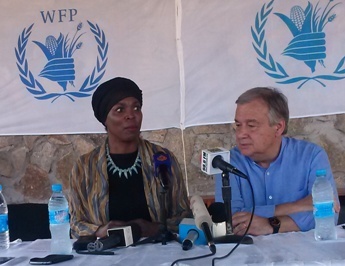UNHCR boss says peace deal key to averting humanitarian crisis
By Tesfa-Alem Tekle
April 4, 2014 (GAMBELLA) – Twenty-year-old mother of two Nyalul Gadbell, who is seven months pregnant with her third child, crossed into Ethiopia on Monday after making a perilous eight-day journey to safety.

The oil-producing state was the scene of heavy fighting, changing hands several times at the height of the conflict and now under government control.
She crossed a hot and barren landscape of South Sudan where drinking water was scarce before reaching the border.
Gadbell’s story is sadly one of many as thousands flee ongoing conflict in South Sudan to neighbouring countries.
PEACE DEAL VITAL
The head of the United Nations Refugee Agency (UNHCR), Antonio Guterres, says reaching a peace deal is vital in ending South Sudan’s ongoing conflict.
Guterres made the remarks during a visit to Gambella, a refugee settlement on the Ethiopia-South Sudan border, where some 85,000 South Sudanese have taken refuge.
More than one million people have been displaced since political tensions erupted in violence in mid-December last year. The conflict has pitted government forces loyal to president Salva Kiir and rebels aligned with former vice-president Riek Machar.
Guterres’ comments come in the wake of a deadlock in negotiations between South Sudan’s warring parties in Ethiopia. The talks, which are being mediated by regional leaders from the Intergovernmental Authority on Development (IGAD), were this week adjourned until next month after the government demanded that seven former political prisoners be excluded from participating in the process.
Guterres warned that failure to reach a political solution to the current crises would lead to a massive humanitarian disaster, saying the world body had already raised the situation in South Sudan to level-three, its highest level used to measure humanitarian crises.
“Peace is an absolute must,” the senior UN official said. “The international community must come together to do everything possible to press the parties to reach a political solution and forge peace. If there is no peace soon, I fear there could be a true humanitarian calamity,” he added.
Guterres made the joint visit to Gambella with the World Food Programme’s (WFP) executive director, Ertharin Cousin, also visiting the newly built Kule refugee camp and Pagak border entry point located in Lare woreda of the Nuer zone, about 200 metres from the South Sudan border line.
At both camps, the two officials said they observed a spiraling humanitarian crisis, coupled with a lack of resources due to the massive influx of South Sudanese.
“The physical and psychological condition of these people is shocking. This is a tragedy I had hoped I would not see again,” said Guterres.
“Many of these people are becoming refugees for the second time,” he added.
He accused the international community of averting its eyes from the crisis in South Sudan despite it being on equal par with the crises in the Ukraine and Syria.
HIGH MORTALITY RATE
At the Pagak transit centre children and women often arrive in an extremely critical condition, suffering severe exhaustion and malnourishment.
On daily basis some two to three of the weakest and youngest children die due a lethal mix of malnutrition, diarrhea, measles and respiratory infections, officials said.
Many of the refugees said they had to walk for at least one to two weeks to reach the Ethiopian border.
On arrival at the Pagak entry point, the UNHCR and media team were informed of the death of a seven-year old child who died from pneumonia.
Many refugees attributed these deaths to improper health care death in the camps.
“Today we witnessed a mother arrive in Ethiopia where help was available, only to lose her youngest child, who was too weakened by their journey. This is a political crisis that is now evolving into a humanitarian catastrophe,” Cousin told reporters.
“We must work together and redouble our efforts to ensure that people receive nutritious food, clean water and other basic services on both sides of the border, so that not another mother cries like she did today because she loses her child,” she added.
APPEAL FOR AID
As the mass influx of South Sudanese refugees continues to strain the resources of international aid agencies in Ethiopia, both Guterres and Cousin jointly called on donor nations and the international community at large to increase their support.
The UNHCR is leading an inter-agency regional appeal for over $370 million needed to meet the humanitarian needs of South Sudanese refugees in Ethiopia, Kenya, Sudan and Uganda.
Rahel Abuhay, a UNHCR representative at Kule refugee camp, told Sudan Tribune that an average of 1,400 South Sudanese cross in to Ethiopia through Pagak.
“Roughly 90% of the refugees are women and children most from the Nuer tribe,” she said.
Despite having to leave her country, Gadbell told Sudan Tribune she still hopes to be reunited with her husband.
“I hope to return home and meet him alive if only peace is restored,” she said.
(ST)
